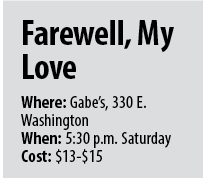Tessa Solomon
When Farewell, My Love hit Phoenix’s emo scene in 2011, it made an impression. Teased hair, jet-black and streaked with white, eyes rung gaunt with black eyeliner, distressed leather jackets revealing tattoo arm sleeves. The members looked like a breathing My Chemical Romance video, which is not surprising considering Gerard Way, the latter group’s lead vocalist, was a major influence.
“When we formed the band, we just wanted to make music that felt movie-esque, Burton-esque and had very good pop sensibility to it,” said vocalist Chad Kowal. “The thing that intially got us going was our love of playing.”
Kowal and the other members of Farewell, My Love will play Gabe’s on Saturday.
In the beginning, it sounded like a passion project until the band began gaining traction. Soon, fans started sporting Farewell, My Love’s logo as tattoos, and audiences began to belt along with every lyric live.
“Seeing the impact our music has on fans proves a driving force to start raising the bar for them or making music that appeals to them,” Kowal said. “We have to affect as many as we can on a positive level.”
This year’s LP, Above It All, saw a new, fresh direction both aesthetically and acoustically. Gone is the abrasive, all-black façade. Now, members come on stage in jeans, relaxed leather, loose-collared shirts. At a glance, it’s more relaxed and individual.
“We had been doing the makeup and drastic outfits from the very beginning of our career, and when you do anything every day, it becomes very stale,” Kowal said.
Not that the heart of the band has changed completely, though.
“We’ll always have that love for big theatric stuff, but we just wanted to pick an image that was still cool and let the music sing through.”
 His reasoning makes sense. A heavy aesthetic can help a band quickly find its genre niche, but it can just as easily become a crutch, like a writer unable to break away from an established subject matter or favorite literary technique.
His reasoning makes sense. A heavy aesthetic can help a band quickly find its genre niche, but it can just as easily become a crutch, like a writer unable to break away from an established subject matter or favorite literary technique.
“I feel like it would give people the opportunity to judge what we sounded like before hearing us, or it deterred people from checking us out because of what a dark image it as,” Kowal said.
Fundamentally more important than the clothing change, though, is the new writing and production approach to Above it All.
“We had a cellist come in; our guitar player played real chords. We were trying to cut out as much fake, computerized instruments as possible,” Kowal said. “There is a real raw emotion that comes through from people that you can’t reach on a computer.”
In the past, lyrics were purposefully epic, spinning a fantastical tale that matched the members’ stage presence. It makes for a high-energy show, but the lack of personality was trying.
“This record was about all the things we’ve gone through as a band. Our past records have been fairy tales,” Kowal said. “For this album, we wanted to get really personal and write songs about our experience. I think fans who may have had similar experiences appreciate that.”



